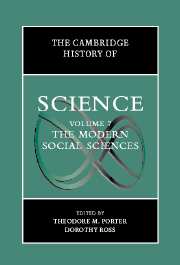Book contents
- Frontmatter
- 1 Introduction: Writing the History of Social Science
- PART I SCIENCES OF THE SOCIAL TO THE LATE NINETEENTH CENTURY
- PART II THE DISCIPLINES IN WESTERN EUROPE AND NORTH AMERICA SINCE ABOUT 1880
- PART III THE INTERNATIONALIZATION OF THE SOCIAL SCIENCES
- PART IV SOCIAL SCIENCE AS DISCOURSE AND PRACTICE IN PUBLIC AND PRIVATE LIFE
- 30 The Uses of the Social Sciences
- 31 Managing the Economy
- 32 Management and Accounting
- 33 Polling in Politics and Industry
- 34 Social Science and Social Planning During the Twentieth Century
- 35 Social Welfare
- 36 Education
- 37 The Culture of Intelligence
- 38 Psychologism and the Child
- 39 Psychiatry
- 40 Gender
- 41 Race and The Social Sciences
- 42 Cultural Relativism
- 43 Modernization
- Index
- References
37 - The Culture of Intelligence
from PART IV - SOCIAL SCIENCE AS DISCOURSE AND PRACTICE IN PUBLIC AND PRIVATE LIFE
Published online by Cambridge University Press: 28 March 2008
- Frontmatter
- 1 Introduction: Writing the History of Social Science
- PART I SCIENCES OF THE SOCIAL TO THE LATE NINETEENTH CENTURY
- PART II THE DISCIPLINES IN WESTERN EUROPE AND NORTH AMERICA SINCE ABOUT 1880
- PART III THE INTERNATIONALIZATION OF THE SOCIAL SCIENCES
- PART IV SOCIAL SCIENCE AS DISCOURSE AND PRACTICE IN PUBLIC AND PRIVATE LIFE
- 30 The Uses of the Social Sciences
- 31 Managing the Economy
- 32 Management and Accounting
- 33 Polling in Politics and Industry
- 34 Social Science and Social Planning During the Twentieth Century
- 35 Social Welfare
- 36 Education
- 37 The Culture of Intelligence
- 38 Psychologism and the Child
- 39 Psychiatry
- 40 Gender
- 41 Race and The Social Sciences
- 42 Cultural Relativism
- 43 Modernization
- Index
- References
Summary
Over the past two centuries, the concept of human mental ability has undergone three important transformations: from a concept referring to a general faculty to one primarily referring to an individual attribute; from a focus on talents in the plural to one on intelligence in the singular; and from a position of relatively limited cultural significance to one of considerable weight within the United States and, to a lesser extent, within various European countries. These shifts in meaning and emphasis have rendered intelligence a tool available to government, business, and the “helping professions” for the purpose of sorting, classifying, diagnosing, and justifying. Starting in the early part of the twentieth century, determinations of degree of intelligence have been used as aids in the placement of army recruits, in determing the kind of schooling a child will receive, in the hiring of job applicants, and in the decision to allow a person legal immigration. This chapter explores how intelligence has come to play these various social roles. It focuses especially on how experts in the human sciences have both created new meanings for the concept of intelligence and developed technologies that could make those meanings available and useful to a wider public.
FROM TALENTS TO INTELLIGENCE
During much of the nineteenth century, two distinct languages flourished in scientific and intellectual circles to describe the operations of the human mind. Mental philosophers and others interested primarily in what would later be called the “normal” employed a language of character and talents, emphasizing the diversity of the mental faculties and the operation of the individual mind.
- Type
- Chapter
- Information
- The Cambridge History of Science , pp. 635 - 648Publisher: Cambridge University PressPrint publication year: 2003

